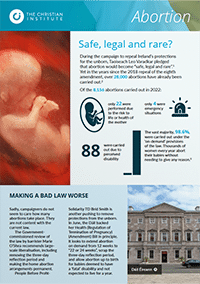The success of the Paralympics shows that our law which allows disabled babies to be aborted anytime up to birth should be scrapped, campaigners say.
A coalition of pro-life supporters and religious groups say the government should repeal the current law which allows abortions at up to 40 weeks if the child will have a disability.
In a letter to The Daily Telegraph, the campaigners argue that terminating pregnancies because of disabilities is a form of “eugenics.”
Bad medicine
This is the belief that eradicating abnormalities from the gene pool will improve society.
The letter states: “Eugenic abortion is bad medicine.
“Killing people with disabilities, rather than striving to support and care for them, is contrary to the high principles of medicine.”
Contradiction
The campaigners used the Paralympics as an example of the “glaring” contradiction caused by the current law.
They say we become “full of compassion” once the baby is born, despite it being legal for the child to be aborted at up to 40 weeks.
The campaigners want the government to restrict the 1967 Abortion Act and promote research into disabilities.
Insult
The letter was signed by Professor Jack Scarisbrick (National Chairman of ‘Life’), Josephine Quintavalle, (Director of ‘Comment on Reproductive Ethics’), Dr Peter Saunders (Chief Executive of ‘Christian Medical Fellowship’) and six others.
But Abortion Rights campaign coordinator Darinka Aleksic, said using terms like “eugenic abortion” is an “insult” to those faced with the choice of keeping or aborting an abnormal foetus.
She said a diagnosis like this puts families in an “extremely painful and difficult situation.”
Down’s syndrome
Recent figures show that last year there were 146 abortions after the 24-week limit in England and Wales.
Overall there were more than 500 abortions after screening for Down’s syndrome.
The BBC came under fire last week for conducting a poll asking Archers listeners whether a couple in the show should abort their Down’s syndrome baby.


